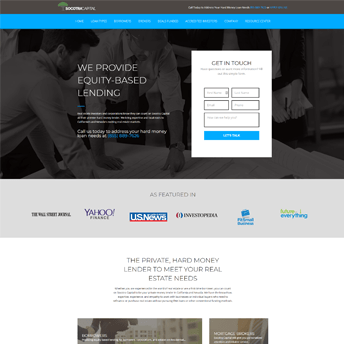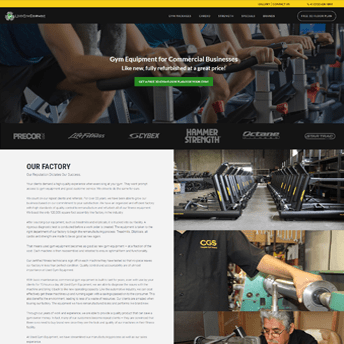What is SEO?
When trying to understand "What is SEO," it can be overwhelming. Here's an all-in-one guide on SEO and how to drive organic traffic to your site.
There are far too many differing opinions, with no universally accepted certification of expertise (aside from Google’s certifications, which we have). So, what makes us better than the rest at helping you rank well in search engines? Well, we take an approach that most SEO companies don’t – we tie in traditional marketing know-how with new tech-savvy digital marketing methodologies.
What is SEO?
If you poll 100 SEO experts, you’ll probably get 50 different answers to this simple question. You’ll hear stories of backlinks and on-page optimization, and a breakdown of what SEO - search engine optimization - means to that particular person.
SEO is the practice of working to optimize your website to rank better in search engines.
The better your website performs in search, the easier it is for people to find, which means you'll get more visits to your website and in turn, more sales, leads, engagements, etc. But, how that's done properly is wildly debated. So, I’ll throw my two cents into the confusion. To break down how to perform search optimization properly, you need to consider two things:
What You are Talking About - The Content
Google and other search engines have come a long way in their understanding of language, and they’ve incorporated that into their ranking algorithms. It used to be that, to tell robots that your website is about a particular topic, you’d have to stuff your desired keywords into your page. That is why, as you peruse the internet, you often come across websites whose content structure seems “off.” Another expression of this is when a webmaster stuffs a footer or sidebar with location-type keywords. The intent was never to help you, as the user, but to try to provide the signals the robots are looking for.
But nowadays, as search engines have evolved, more value is placed on honest, clear, concise and authoritative content. If you’re writing about a topic in the hopes that it will rank (though, you should always write to answer the questions of your customers or users), you need to make sure that your write-up is well-written, properly cited, and straightforward.
Don’t worry about shoving keywords into your content - those will happen naturally. Don’t listen the various SEO tools that tell you your keyword relevance score is too low, or your site readability is only 50 out of 100 - just write natural, focused content about topics people are interested in. That’s not to say you shouldn’t make sure it’s well-written, grammatically correct and easy to read, but don’t get caught up in the minutiae of crafting content around keywords. Just write, and lean on your own expertise as well as others’ when applicable.
What Others are Saying About You - The Links
Arguably the most important ranking factor for a website is the quantity and quality of backlinks. From the inception of Google’s original algorithm to today, backlinks tell web crawlers that someone else is “recommending” your website. And as more authoritative websites link to yours, that tells search engines that your site has more value and authority as well.
Think about it this way - if you’re being talked about in the news, or recommended by an expert, that gives you more authority. The assumption is that if you’re newsworthy, you’re more valuable than those who aren’t (hopefully for good reasons).
Backlinks are just the internet’s expression of those real-life mentions. So, the more you have, and the better they are, the more value that search engines assign to you and your website.
How Much Does SEO Cost?
When looking at hiring an SEO agency, one of the most wildly variable things I've seen is price. You'll hear rates on retainers varying from the hundreds to the tens-of-thousands, and hourly rates from near-minimum wage to rates you'd expect from your attorney.
Why is this? Well, you've got to segment freelancer versus marketing agency rates (an individual working from home can charge significantly less than an agency with a large staff and overhead), as well as rates from companies performing the work in-house versus outsourcing. I have to pay my staff competitive salaries, health insurance and other benefits, but an account manager whose team is in India can pay their workers under $10 an hour.
Adding the fact that comparison shopping for price isn't easily done in our industry, you have no standard for pricing to help you get a sense of what's reasonable.
source: Ahrefs.com SEO Pricing Survey
What's the average monthly retainer for SEO services in the United States?
Do You Need to Hire an SEO Agency?
The answer to whether you need some form of SEO is always yes. However, whether or not you need an agency is a different question entirely. Often, businesses come to me to inquire about our services, and are debating between hiring us and another firm - and I tell those businesses very quickly that they shouldn’t be hiring anybody (as much as I’d love to get paid). Why is this? There are a number of reasons, so here’s a quick list:
- Your vertical is greatly impacted by large companies with deep pockets and history, so for you, your budget may return a lot better in other areas like PPC or even traditional outreach marketing.
- Your service or product can’t justify a high spend-per-conversion rate. Simply, if you are creating a brand of $5 socks, you can’t spend $10 to get a sale. So, your efforts are likely better focused on other marketing strategies.
- You are starting your business fresh and have a lean marketing budget. Build your brand, your core messaging and services, and other platforms before you invest in SEO.
- You need immediate results. SEO is a long-term game, so you can’t expect results for (depending on the competitiveness of your product or service type) a very long time. If your business viability needs immediate results, investing a ton in search may not be the best choice.
How To Identify the Best SEO Company
Weeding through search engine optimization services is pretty confusing. As soon as you send out a couple solicitations, you may start getting phone calls and emails from other SEO firms, promising they can “get you to the first page in Google” or “help you build backlinks.” They often pitch SEO packages with specific quotas of optimized keywords and thousands of backlinks—both of which are good signs that you’re dealing with a shady company that’s going to get your site hit with a Google penalty. How can you tell which one is the best partner for you, and what are some things to look out for?
Check the Quality of their Own SEO
When we say this, we don’t mean check their search rankings, though that’s certainly a factor. If they have a newer site, or are in a really competitive niche, they may not rank on the top page, especially if they’re white hat—it can take a year of hard work to have strong, consistent rankings. Rather, check to see if they do the little things correctly. When you search for their company name, are they the first result? What are the other pages that come up with their branded search—have they taken the time to set up pages on Facebook, Yelp, LinkedIn, and elsewhere? Does their meta description—the text just below the site’s title—make sense and make you want to learn more? Have they properly set up their Google My Business page so that their business is described in the sidebar of Google’s search results?
Look at their portfolio of previous work, check reviews of SEO companies you’re considering, and verify their claims.
Do they actually list clients they have worked with? Do they provide case studies? Are there customer reviews on other sites that reflect their claims? There are some reasons to keep your clients private, but the majority of SEO clients are more than happy to have their name and link on the SEO firm’s site. After all, it’s free publicity. If you can’t find any evidence of them doing work for real companies, there may be a reason.
And don’t be fooled if they have logos of major companies on their homepage. They may well have worked with an affiliate of the company, or perhaps once helped a local car dealer and subsequently claimed to have provided services for Toyota. In fact, firms have been known to fraudulently list major companies as clients because they know it’s unlikely they will be caught. Always ask for referrals and links to sites that they worked on, and then call the clients to verify!
Does their price point make sense for a legitimate SEO agency?
If they’re offering packages featuring “15 keywords for $500,” or any kind of standardized pricing, then they are usually not a firm that will work in your best interest. If they have a table of bronze, silver, gold, and platinum packages, that’s a red flag.
SEO companies that value the work they do will perform an in-depth investigation before they offer you a quote. Every company faces unique challenges—issues unique to their markets, competition, and goals. In fact, in most cases, reputable firms won’t offer varying price points based upon the number of keywords or backlinks. Placing these sorts of artificial limits means that they aren’t going to work to generate the best possible results. Would you be content to provide your customers with mediocre services or an iffy product?
The rates charged by SEO firms vary widely. You’ll find firms that charge by the hour, offer monthly rates, or charge a fixed one-time price. Regardless of their fee structure, a reputable firm will provide a clear and concise description of what their services include, how long it will take, and what their goals are. If they don’t get into the specifics, or offer a quote without getting to know you, then beware. Imagine a painter quoting you a low price without ever looking at your home and finding out how many total square feet they have to paint before offering you a quote–you know they’ll either do a shoddy job, never finish, or tack on hidden fees.
And keep in mind: SEO is time intensive. We never promise to be the cheapest SEO company around, because we charge rates commensurate with the significant amount of work that our SEO services entail. We couldn’t charge cheap rates and provide a quality product, while paying our rent and taking care of our employees.
If you’re talking to an independent contractor that works from home, then they may be able to keep their rates lower than those charged by larger firms. But if you’re talking to what claims to be a big firm with an in-house staff, and they’re happy to charge a few hundred bucks a month, then something isn’t right. They either utilize a strictly automated process that will hurt you in the long run, they outsource to an overseas company, or they’re simply not going to deliver on their promises, because they can’t afford to.
Trustworthy SEO experts will ask questions - a lot of questions.
What kinds of questions did they ask you? A trustworthy SEO firm will strive to understand your customer base, your site’s current performance (they will often ask for access to your site’s analytics), and what your goals are for your site and your business. In turn, they will lay out reasonable goals. They won’t guarantee first page in a set amount of time, but they will work to maximize the ROI of your investment. Oftentimes, when you walk into an interview with a solid firm, you’ll find that they’re the ones asking the questions. Don’t be intimidated. They are just trying to understand your business on a technical and cultural level, because they know that SEO isn’t a one-size-fits-all process.
Even after you’ve hired an SEO firm, keep a close eye on their work, your search engine rankings, and your overall performance.
If you hired an employee, you would make sure you could work well together long-term during the probationary period. You should do the same with the agency you choose. Make sure they report to you on what they’re doing, and the results of their work. Make sure you can understand their answers—don’t be afraid to ask questions. SEO is complex, but anyone can understand it.
Understand that you’re trusting your online reputation with another company–make sure they have your best interests in mind, not just their bottom line.
White Hat Versus Black Hat
A very common distinction in the world of SEO comes from defining the approach to how we perform our services. The perception that the white-hat groups are the "good guys" and black hat the "bad guys" is an oversimplification.
Simply put, white-hat SEO professionals are those that build and manage your website and internet presence following all webmaster guidelines published by Google. Black-hat SEOs are willing to go against these rules in order to try to gain an added benefit by "gaming the system" to their benefit.
But, you'd be surprised at how many things are technically against the guidelines, like having followed promotional links on third-party sites. For example, if you buy an ad from a website, a perfectly normal behavior, and don't know any better, you could be penalized for "buying links." So, it's not as clear as you'd imagine what's free and clear and what's not.
Our general policy is this:
- Build your website for your customers first and foremost - if your motivation for doing something is to appease the web crawlers, you've probably got the wrong perspective.
- Write your content just like you would your own sales materials. Don't even think about keywords or things like header tags, density and so on. Just be natural - the rest will come.
- When it comes to link outreach - don't ask for links for the sake of links. If you are promoting your business properly, that will come naturally and you'll be credited where you should be.
- As an SEO firm, don't do anything that would potentially risk your client and their ability to be found online. A small-time gain is nice, but not worth causing major damage to a business by getting them delisted from what is essentially the front door to the internet.
That's not to say there isn't value in making sure you follow web best practices, just that if your whole purpose is to manipulate search rank, you're doing it for the wrong reasons.
Some clients we've helped and their unique SEO challenges
There is never a "one size fits all" plan for search optimization. Every business and website has its own customers, challenges and goals. So, there's no way for us to prescribe any of those standard "10 keywords and top rank in google" plans you see around. Here's a sample of past clients and the challenges we faced (and overcame).

Client: Socotra Capital
Challenge: Multiple Competing Websites
Results: Top 1-3 ranks for all targets
Socotra Capital came to us with a goal - to rank their three websites better in their marketplace for their targeted keywords. One site was geared to speak to investors, and the other to borrowers. The first challenge for us, however, was to convince them to merge the sites as they had other SEO companies do that in the past and tank their Google rankings.
The next challenge was to properly merge three websites, while mapping out the content priorities, focuses and redirects, to make sure we didn't lose any search equity. At the end, not only do they have only one site now, but it's a site that ranks on the front page in local results and organic results for all of their targeted keywords, helping to grow their business over the several years we've worked together.

Client: RizKnows
Challenge: Confusing Site Structure
Results: Organic traffic increased to 200k/mo.
RizKnows made affiliate marketing work through hard work and commitment. When we built their website, they were getting about 7,000 organic visits to their site per month. Less than two years later, they're getting over 250,000 visits monthly and rank on the front page for most of their targeted topics.
The challenge was determining how to make their homepage, the page most would put their SEO effort into above the rest, not the focus in the search results, but rather their targeted content. Through proper segmentation of categories and page structure, we were able to make sure that their site didn't suffer from content cannibalization and ranks well for almost all targeted keywords.

Client: usedgymequipment.com
Challenge: Google Penalty
Results: Relisted and First Page Ranks
Usedgymequipment.com, if you can't tell from the exact-match domain name, had a long history of SEO tactics that were geared to specifically rank in Google. But, Google caught up with the times and techniques, and penalized the website for its spammy tactics. It wasn't their fault, they had trusted other SEO firms to help market them, now knowing the black-hat work that was being done.
When UGE came to us, their business was hammered and their ranks were gone, and we had to dig in, diagnose, repair, and submit the website to Google, hoping to get them listed again. And we did - we cleaned up their spam and fixed the other issues, got them listed and ranking well in Google, and trained them on how to do things on the up-and-up from there on out.
Getting Traffic Isn't the End Goal
One of the common questions I ask is, "would you rather have 100,000 visitors and 10 conversions, or 1,000 visitors and 100 conversions?" It's straight to the point. You shouldn't worry so much about your website traffic, but rather the quality of that traffic. I've seen websites that get 100 visits a week be wildly successful, and sites that have tens-of-thousands visits be failures.
So, don't neglect your landing pages and how your customers interact with them. Instead of focusing on stuffing keywords or hitting the right variables in the ever-changing SEO formula, consider what best serves your customers. Make sure to think about what the customer is expecting to see, and address that first. Then determine your call-to-action or engagement goal, and craft the page to meet that. Only after that should you consider working to make the robots that crawl your site happy.

On-Page SEO
On-page SEO is the more technical side of things; it's the nuts and bolts of your website, your approach to the layout, and the code and functionality. Getting everything right and up to par with best practices is key to a successful SEO strategy. If people and crawlers can't read or understand your website, you won't get very far. Some of the things to consider are:
Content Strategy
The traditional thought about your website's content is that the more, the merrier. The idea was that the more content you have about a subject, the more likely Google is to identify your website with that topic. That's simply not true any more. Google and other search engines have come a long way in understanding content, specifically with regard to intent. After all, their overall goal is to be able to read your website the same way a human would.
So, when breaking down your content and strategy, consider the message you're trying to give. Consider what your website visitors expect to see, and make sure to address that first and foremost. And then create supplementary information to support that topic, and add it to the same page - not an additional content piece - to strengthen the focus topic of that page.
One exercise we go through with our customers is to have them or their sales team keep track of the questions customers are asking. When you get a phone call or email, write down the questions that you're asked, and over time, you'll get a clear picture of the information that you need to write about on your website. This not only gives you a good idea of the content to have, but also what people are asking, and thus searching for (search engines are, after all, just an expression of the question-and-answer dialogue we have as consumers).
Keyword Research
Another supplementary approach to determining your content is utilizing proper keyword research. By understanding the volume and intent behind various keyword searches, you can get a sense as to what your market is looking for, and what content you need to address. There are a few different tools you can use to see trends for keywords, but the first one we check out is the Google Keyword Planner in Google Ads, since we often combine PPC marketing and SEO efforts.
But, don't just blindly look at the largest-volume searches and set those as your targets. You need to see what is behind those searches - the intent. Understand why people are using those keywords - is it educational-based, purchase-based, local-based, and more, and make sure that your content strategy falls in line. There's a huge difference between a "what is" and "where is" type search, so make sure to note the difference.
Website Structure
While considering your website content, you also need to consider how people are going to get to that content. Your web navigation and structure is key to successful on-page SEO. Consider the route your users are going to take to get to the pages you want them to get to.
The most obvious expression of this is your website header. Make sure any important, essential pages that are part of the decision-making process are linked there, but don't go much deeper than that; it's too easy to overwhelm users with too many confusing choices. List your core services or products there, as well as important "about" and "contact" pages, and leave the rest of the navigation to relevant, contextual sub-menus or inline hyperlinks in your content.
In the SEO world, there's always a discussion about "link juice" or "PageRank sculpting," but really, focus on making your navigation make sense for your users and the rest will naturally follow.
Speed is Critical
Your website is only good if your users can load and read it. So, make sure that your website loads quickly and your visitors get the images and content that are important to them. This is especially important for mobile devices, where often the user is limited to the bandwidth of their mobile network. This is why Google made mobile page speed a ranking factor recently.
A few common issues that webmasters often neglect are things like image size, loading of external scripts, and a lack of caching. Button all of these things up for a better, quicker experience. You can test your website right now here, and get an idea of how your website performs - don't fret about getting a perfect score, but try to make it, at the very least, hit the "yellow" score range.
Off-Page SEO
Arguably, the most important factor in determining how your website is going to rank in search engines is outside of your direct control. Like the old adage, if you have best content in the forest, but nobody hears you promote it, does it even show up in search? The answer is less existential than that. Simply put, no.
Backlinks - The Foundation of SEO
As we mentioned earlier, the web's expression of referrals and promotion are in the form of backlinks. This is why your contact forms get filled every day with offers from SEO companies to give you backlinks from "PR 6+ websites" and "high-quality domains." But don't fall for these offers! Any backlink that will be worth anything for you is going to be gained naturally. In fact, buying them is strictly against Google's guidelines and will get you penalized harshly.
So, how do you go about getting actual, natural links?
Mixing Traditional PR with the Online World
If something happens with your company that's newsworthy, you'd likely put the effort into promoting it. Maybe you had a major purchase, expansion, invention, or event - you'd make sure that your entire community would know about it. You'd call the newspaper, the local chamber of commerce, your industry organizations and others. It's the same online. Promote yourself to those entities, not blindly but with a purpose, and you'll see results.
Be an Expert and Resource
Another great way to build links is to become the go-to person for your subject matter. If you're the best dang pool guy in the tri-counties area, you should promote that fact and work towards giving workshops, speaking engagements, and be a source for writers covering swimming pool-related topics. You can do this not only in your community, but through social media, forums and resources like HARO where journalists requests sources. If you're quoted or have content you've written promoted on other websites, that usually comes with a link, which you earned the hard way!
Good, Informative Content
The most passive way to build links is by writing great content that's informative and helpful. Instead of writing the next "top ten" article, really dig into an issue that people care about, or a problem that's not easily solved, and become that resource. You'll find over time that other writers are linking to you as that resource, and it becomes a kind of self-fulfilling growth of the value and search rank of that page. The more people that link to it, the more likely people are to see it and link to it.
Local SEO
If you're a local business where you service your neighborhood or city, or your customers come to your store or restaurant often, you're going to want to invest in some local SEO, which has a few more complications in order to rank well. If your SEO company doesn't include local search into your strategy, you need to make sure that it's considered and focused on - especially for retail, restaurants, or other similar destination businesses - where the search intent is local and you're not likely to rank in the normal organic results.
Google Business
The "landing page" of your local business is your Google Business listing. If you haven't already, stop reading this page now and go claim it. This is what dictates whether or not you show up in that "map pack" - the results that include the map, as well as when people search for your business type on their phones. Make sure to fill the info out fully and accurately, and then over time work towards building positive reviews.
Review Sites
Another ranking factor in local SEO is how well you're regarded, expressed in the form of reviews. If you have one star on Yelp, for instance, you're less likely to show up organically (whether it's your Yelp page or other review site in the results). Make sure to claim all of your relevant listings and work towards garnering a positive reputation to better improve your chances of showing up in the search results.
Directory Links
Any website that lists companies and organizations in your vertical should be considered a resource for your customers to find you. So, make sure your business and website are on them. Don't worry about sites that clearly aren't actually relevant or used - those weird listing sites that seem to have no value - but if there's a common industry website, local chamber of commerce, or community website, try to make sure you're on it.
With all of these areas, make sure that your NAP - your name, address, phone - is consistent as to not confuse Google as to where you really are.
Our favorite SEO tools
We have a strict approach to how we build our websites to ensure that the site looks great, is easy to use, runs fast, and is stable, long-term. Here are the systems and plugins we use for all our sites.

WordPress is by far the most popular CMS on the market. It helps us structure our page content in a logical way, and because of how we develop websites, we can keep things light and fast for a better site speed and user experience.

Ahrefs is a great tool to help us keep an eye on our backlink and outreach strategy. Not only that, but we can break down and identify what competitors are doing in their process, track keyword rankings and difficulty, and get a general idea as to how our SEO efforts are performing.
Google Analytics is the obvious choice for monitoring and digging into your website's traffic and user behavior. You can see how many people visit, where they come from, what they do, and use all this data to better structure your website to meet your customers' needs.
Yoast SEO helps us easily manage things like sitemaps, meta titles and descriptions, and other SEO-related tasks on the website.
Google Search Console (formerly Webmaster Tools) is the direct source of information on how Google sees our site. It helps us check the overall health of our website, track broken pages and crawl issues, and more.
These are the tools we use on a daily basis, but we have so many more that we use depending on the situation to review things like site speed, content breakdowns, error diagnostics, local directory submissions and more.